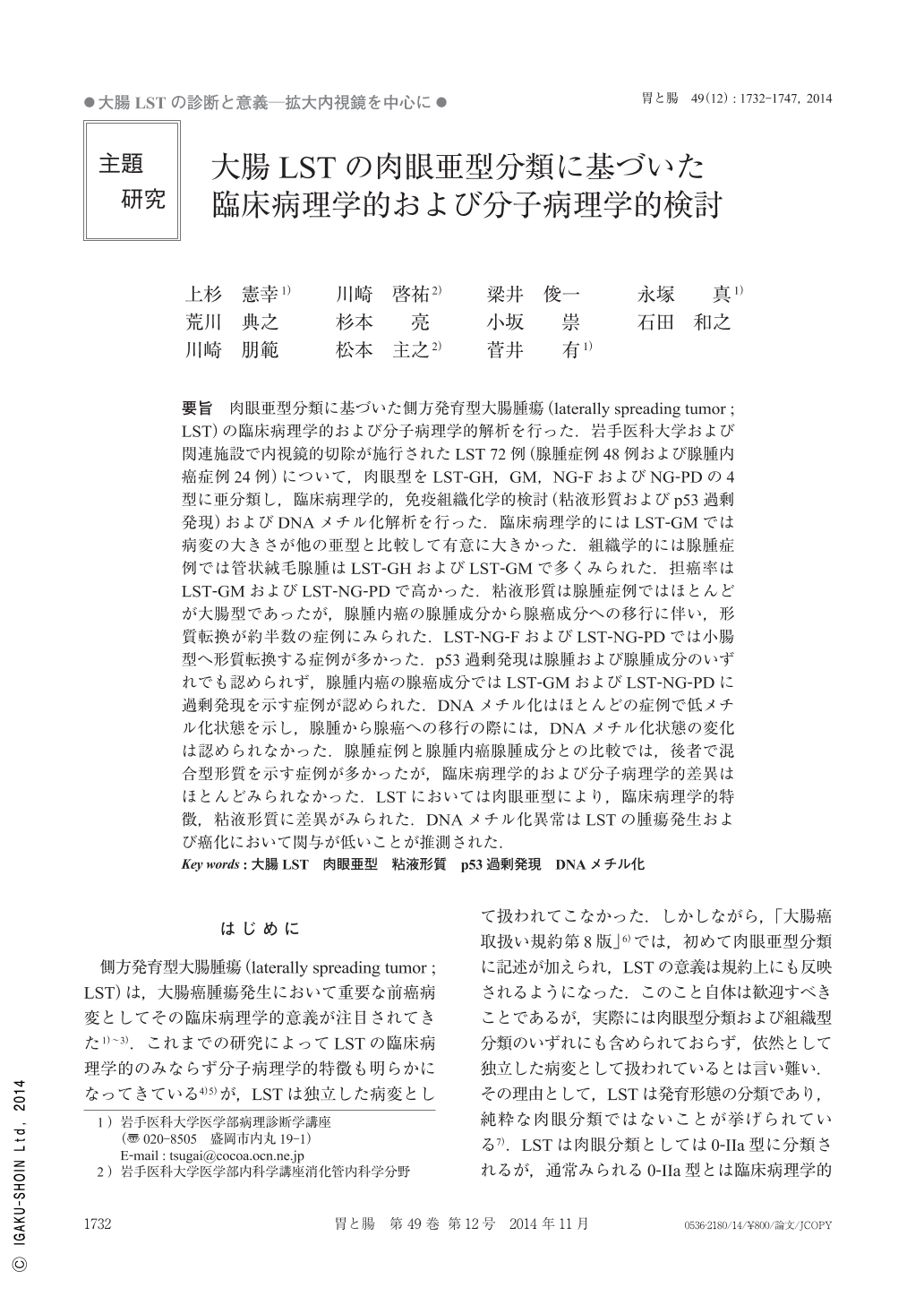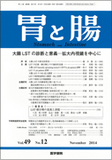Japanese
English
- 有料閲覧
- Abstract 文献概要
- 1ページ目 Look Inside
- 参考文献 Reference
要旨 肉眼亜型分類に基づいた側方発育型大腸腫瘍(laterally spreading tumor ; LST)の臨床病理学的および分子病理学的解析を行った.岩手医科大学および関連施設で内視鏡的切除が施行されたLST 72例(腺腫症例48例および腺腫内癌症例24例)について,肉眼型をLST-GH,GM,NG-FおよびNG-PDの4型に亜分類し,臨床病理学的,免疫組織化学的検討(粘液形質およびp53過剰発現)およびDNAメチル化解析を行った.臨床病理学的にはLST-GMでは病変の大きさが他の亜型と比較して有意に大きかった.組織学的には腺腫症例では管状絨毛腺腫はLST-GHおよびLST-GMで多くみられた.担癌率はLST-GMおよびLST-NG-PDで高かった.粘液形質は腺腫症例ではほとんどが大腸型であったが,腺腫内癌の腺腫成分から腺癌成分への移行に伴い,形質転換が約半数の症例にみられた.LST-NG-FおよびLST-NG-PDでは小腸型へ形質転換する症例が多かった.p53過剰発現は腺腫および腺腫成分のいずれでも認められず,腺腫内癌の腺癌成分ではLST-GMおよびLST-NG-PDに過剰発現を示す症例が認められた.DNAメチル化はほとんどの症例で低メチル化状態を示し,腺腫から腺癌への移行の際には,DNAメチル化状態の変化は認められなかった.腺腫症例と腺腫内癌腺腫成分との比較では,後者で混合型形質を示す症例が多かったが,臨床病理学的および分子病理学的差異はほとんどみられなかった.LSTにおいては肉眼亜型により,臨床病理学的特徴,粘液形質に差異がみられた.DNAメチル化異常はLSTの腫瘍発生および癌化において関与が低いことが推測された.
Clinicopathological and molecular-pathological analyses of colorectal laterally spreading tumor(LST)was performed based on macroscopic subtype subclassification. Seventy-two cases of LST(adenoma, n=48 ; carcinoma-in-adenoma, n=24)that were endoscopically resected at Iwate Medical University Hospital and affiliated institutions were macroscopically subclassified as GH, GM, NG-F, or NG-PD, and clinicopathological, immunohistochemical(mucin phenotype and p53 overexpression), and DNA methylation analyses were performed. Clinicopathologically, the GM cases were significantly larger in size than the other subtypes. Histologically, in the cases of adenoma, a component of tubulovillous adenoma was frequently seen in the GH and GM cases. Cases with a carcinoma component were frequently observed in the GM and NG-PD cases. For the mucin phenotype, although most cases of adenoma were of the intestinal type, conversion of the mucin phenotype was observed in half of the cases of carcinoma in adenoma based on the transition from adenoma to carcinoma component. Conversion to a small intestinal mucin phenotype was frequently observed in the cases of NG-F and NG-PD. p53 overexpression was not detected either in the adenoma cases or in the adenoma component of carcinoma-in-adenoma cases, whereas it was observed in the carcinoma component of GM and NG-PD carcinoma-in-adenoma cases. Almost all the cases showed a low-methylation epigenotype on DNA methylation analysis, and conversion of DNA methylation status was not observed during the transition from adenoma to carcinoma. In comparing the adenoma cases and the adenoma component in carcinoma-in-adenoma cases, cases with the mixed mucin phenotype were significantly more frequent in the latter. In LST, clinicopathological features and the mucin phenotype differed among the macroscopic subtypes. The findings of the present study suggest that alterations in DNA methylation status are less involved in tumorigenesis and carcinogenesis in LST.

Copyright © 2014, Igaku-Shoin Ltd. All rights reserved.


